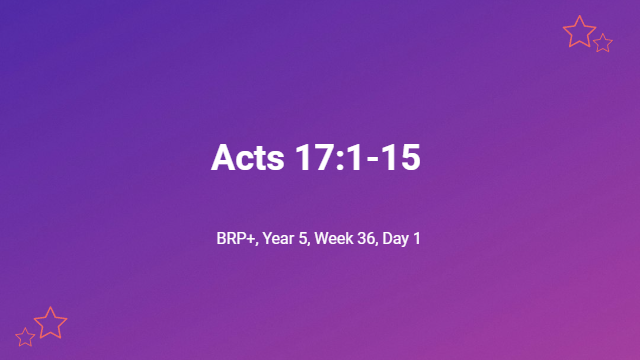Acts 17:1-15
Q.1. What was Paul’s normal starting point in a new city? Was this the best place to start? What do we learn from the response to the gospel? – (Acts 17:1-5)
Paul invariably started at the Jewish synagogue, according to his custom. He knew that they met each Sabbath day, and that they knew the Scriptures. He also knew that they often attracted proselytes from other nationalities. This was undoubtedly the best place to begin (see Acts 17:1-2). He – 2 reasoned with them from the scriptures 3 explaining and giving evidence that the Christ had to suffer and rise again from the dead, and saying, “This Jesus whom I am proclaiming to you is the Christ” (Acts 17:2-3). As normal, there were two kinds of responses. Some of them were persuaded, including a – … a large number of the God-fearing Greeks and a number of the leading women (Acts 17:4). However, jealousy on the part of some staunch Jews soon stirred up trouble (see Acts 17:5). This was to be expected.
Q.2. Why did they focus on Jason? What was their charge against the evangelists? What was the outcome? Why were Paul and Silas sent away? – (Acts 17:5-10)
Jason was criticised because he had welcomed the evangelists into his house (see Acts 17:5 & 7). Jews were monotheists, so were hostile to Caesar and Roman rule. The resistance of the Jews to the gospel was hypocritical, when they accused the evangelists of acting – … contrary to the decrees of Caesar, saying that there is another king, Jesus (Acts 17:7). Their impact had been enormous – … These men who have upset the world … (Acts 17:6). Their opponents managed to stir up the crowds. The city authorities took a pledge to ensure that they kept the peace. The believers sent Paul and Silas away for their own safety (see Acts 17:10).
Q.3. Where did Paul and Silas go? How did the Bereans respond? From where did opposition come? Where was the team forced to flee? – (Acts 17:10-15)
Paul and Silas moved up the coast to Berea. They were well received, because – these were more noble-minded than those in Thessalonica, for they received the word with great eagerness, examining the Scriptures daily to see whether these things were so (Acts 17:11). The response was significant, when – many of them believed, along with a number of prominent Greek women and men (Acts 17:12). However, Paul was soon forced to flee the hostile Jews who had come from Thessalonica (see Acts 17:13). Silas and Timothy stayed out of sight, but Paul was escorted on to Athens (see Acts 17:14-15).

